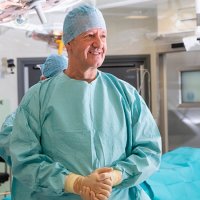COVID-19: What should I do if I think I have a hernia?
Autore:The current lockdown is likely to continue until there is evidence of a consistent reduction in cases from COVID-19. Even then, any loosening of the lockdown is likely to be slow and patchy because the disease is at different stages throughout the country. The lack of a vaccine or treatment will also mean that social distancing measures will continue for some time and the resumption of normal medical activities, such as clinics and routine surgery, is likely to be a few months away at least.
One of the most common surgical conditions is that of a groin hernia and, no doubt, many of you will be sitting at home aware that you might have a groin hernia but unable to seek a specialist's opinion or advice.
To help you, Mr Alan Woodward, renowned consultant general and colorectal surgeon based in Cardiff and Pontyclun, has answered some of the most frequently-asked-questions concerning hernias and COVID-19, which may be of benefit to you.

How do I know if I have a hernia?
Hernias most commonly present as a swelling in the groin, and although they are most common in men, women can also develop them. The swelling usually appears on standing and disappears overnight or when lying down. The swelling is typically due to the intestines protruding through a defect in the abdominal muscles, and appearing as a bulge under the skin.
What should I do if I think I have a hernia?
The vast majority of hernias are painless, and so may not cause much inconvenience. During this period of confinement, it is still important to stay fit and active, so daily walking, running or cycling is still to be encouraged. It is advisable to avoid strenuous activities such as weight lifting as this may exacerbate symptoms from a hernia and possibly encourage the hernia to enlarge or even strangulate.
Should I worry if my hernia causes pain?
The main risk of a hernia is that of strangulation when the bowel becomes stuck in the abdominal wall defect. It occurs in 1 in 2,000 cases and is a serious complication. Providing the swelling disappears on lying down, then the hernia cannot be strangulated.
If the hernia is becoming more uncomfortable, then this is often because it is enlarging. If a previously reducible hernia suddenly becomes persistently present and tender to touch, this suggests the possibility of strangulation (when the blood supply to the bowel is reduced) and requires emergency surgery.
I've heard that I can wear a truss. Is this an option?
Abdominal supports can provide temporary relief from groin discomfort, but are not a long-term alternative to surgery.
Do all hernias require surgery?
Not all hernias require treatment and this decision is best made jointly with your specialist.
What is the best operation for hernia repair?
There are several procedures available, and the treatment should be tailored to you as an individual depending on your level of fitness and lifestyle.
Do I have to have repair using mesh?
The recommended repair in most parts of the world is with the use of mesh, as this provides an excellent repair with a low recurrence rate. For patients who do not like the idea of a mesh being inserted, a repair with stitches (sutured repair) can be undertaken.
I have several medical problems, should I be worried about having anaesthetic?
Groin hernias can be repaired under local anaesthesia very safely. It is rare to be turned down for hernia surgery on the grounds of having other medical conditions.
If I have to wait to have my hernia repaired, will it cause problems?
Waiting a few months to have a hernia repair is unlikely to cause any problems. If the wait is prolonged and the hernia enlarges into the scrotum, this could theoretically result in a higher postoperative complication rate, such as significant bruising or recurrence, and so it is preferable to have your hernia repaired before it reaches that stage. Hernias tend to enlarge over a year or two rather than over weeks or months.
If you are concerned about a groin hernia, don't hesitate to book an appointment with Mr Alan Woodward via his Top Doctors profile today or directly book an e-Consultation with him.


